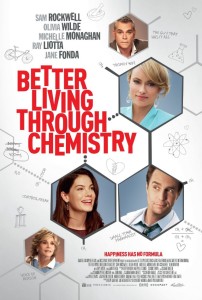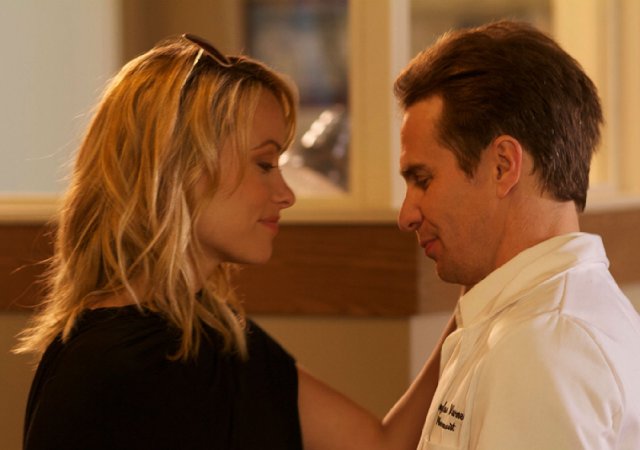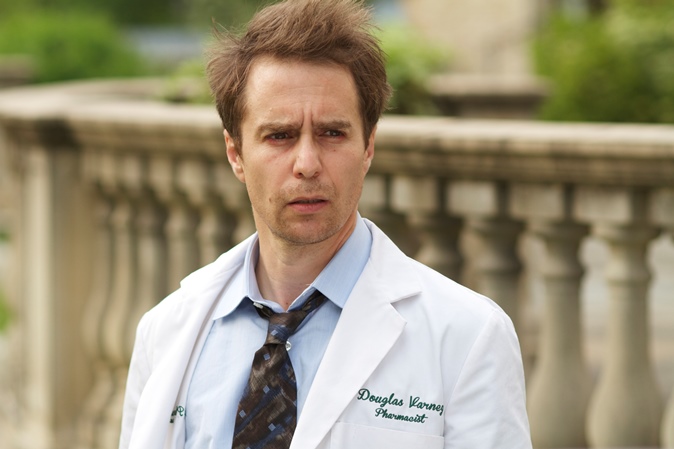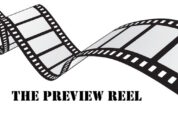David Posamentier and Geoff Moore have been writing together for about ten years. Each has an impressive resume of films they’ve been a part of in some way. Posamentier worked for writer/director Zach Braff on Garden State. Moore has worked on such films as Confessions of a Dangerous Mind and I Love You Phillip Morris. Having worked so long writing and developing projects for others, it seemed inevitable that they would eventually decide to direct themselves. Which is precisely what they have done with the dark comedy Better Living Through Chemistry.
The film tells the story of small-town pharmacist Doug Varney (Sam Rockwell) who’s conventional and boring life is turned upside down when he meets the alluring Elizabeth Roberts (Olivia Wilde). As the pair begins a drug-fueled affair, Doug undergoes a transformation that may ultimately lead him down the path to a better life.
Posamentier and Moore spoke with CinemaNerdz recently about Better Living Through Chemistry, their debut as co-directors. The discussion covered everything from working with Jane Fonda, how they got started as a writing team, and what was the story behind the film’s stunning opening credit sequence. What follows is a transcript of that discussion.
[divider]
CinemaNerdz: The opening credit sequence sets the tone for an exploration of what lies beneath the idyllic small American town, at least as it will apply to Doug Varney’s life. I was wondering how that all came about.

So when we went back and basically sliced off this whole prologue, we needed something to help catapult or slingshot us into that world. When we started to talk to title design companies we told them we need energy, we need something that sort of sets up the world that you just mentioned, the idyllic suburb, but also something that shows the interaction or chemistry between people. It’s an easy pitfall to get stuck in, focusing on chemicals and reactions and periodic tables and that’s something we didn’t want to do. This has never been a message movie. It was never about drugs. It’s about the chemistry between people and relationships. So that was sort of the marching orders and this company named Logan really blew us away when they came back with this concept.
CinemaNerdz: Were you influenced by any other films while working on the screenplay?
GEOFF MOORE: Not directly. We’re obviously both huge cinephiles and when we first started writing together ten years ago, part of the process of getting started as writing partners was talking about which films, writers, and directors we admired. There’s always stuff in there. There’s always stuff bubbling around. Who can say what the direct and indirect influences are, but just like Dave said, this isn’t a message movie with any sort of point. There wasn’t any particular film that we were trying to imitate or draw parallels with. It was really that we wanted to tell the story of Doug Varney in this sort of crazy world and let’s just do that. When we’re sitting around talking about influences, people who probably show up without us even realizing it are people like Sidney Lumet, the Coen Brothers, Harold Ramis, and Steve Martin. Those are the biggies. We are children of the 1980s in terms of movie comedies so a lot of Harold Ramis and John Landis films top our list. But this one didn’t have any particular providence.
POSAMENTIER: I think it’s a good mix of the real and the absurd. Where you’ve got the Steve Martin absurdity mixed with the realness of Sidney Lumet, James L. Brooks, or a Harold Ramis.
CinemaNerdz: You’ve been working together for some time as a writing team, can you talk about how you began that relationship?
POSAMENTIER: We were both working at two different productions companies that were producing the same movie and we just struck up a rapport over work and it evolved into a friendship where we spent more time making each other laugh over email or phone calls all day versus doing our work, which we were supposed to be doing. From that we got together and got breakfast in the morning and we were like, you know we spend all day writing pages of emails just laughing and distracting ourselves maybe we should just try writing a screenplay. We did and it was a similarly small, very character driven dramatic comedy that we never really made a dime off of. We never sold the thing and nothing really ever happened with it. But it helped us get an agent and it helped us get our first studio writing gig and was just sort of a calling card when we first came out of the gates. From there we were off and running.

Sam Rockwell and Olivia Wilde in “Better Living Through Chemistry.”
Photo Credit: Bill Gray / Samuel Goldwyn Films.
CinemaNerdz: Why did you decide to make your debut as directors with this film?
MOORE: I think it was a variety of things. We do spend most of our time working with studios, whether it’s on rewrites or pitching new things or original material. It’s great and there are obviously a lot of big and interesting movies being made by the studios. But when you’re a screenwriter you’re very often on the bottom rung of the ladder at the studio and we were sort of in between a couple of jobs and had a couple of months. We’d had the core idea for this story. So, we just buckled down and wrote it pretty quickly and it just kind of came out. We had talked about directing before and it was certainly something that was on our career plan, even though we don’t really have a career plan. It was just something we’d talked about. We realized that it’s a very small story, all things considered, there’s no CGI, there’s no explosions, there’s not a lot of complications to it. We could shoot it in one broad location with just a couple of settings. It’s the kind of thing where we could do this. Knowing that the first step in getting a directing gig is convincing people that you can direct and that you’re taking it seriously, we hired a line producer to make a budget and a schedule so that a) we knew what sort of zone we were in, which was obviously pretty low budget and b) we could then take that package to our agent to take to potential producers and potential financiers to say not only did we write this, we are going to direct it and here’s how we’re going to do it so let’s partner and move on from there. It was semi-calculated, but it wasn’t like we started out saying, we’re going to write this script and then direct it. It was a little bit of an after-process.
[pullquote_right]If anyone’s going to f**k it up, it should be us.[/pullquote_right]POSAMENTIER: I think just one component, a big one, is heartbreak. We’ve watched so many different projects get screwed up and destroyed and pride ourselves on writing really good scripts that were on the precipice of a green light or that had a director come on board, that just went totally sideways, we’d just had enough of that and figured hey, if anyone’s going to f**k it up, it should be us.
CinemaNerdz: You had several cast changes early on in pre-production, did these cause any problems for you in terms of altering or rewriting characters or was this a case of everything working out exactly as it was supposed to?
POSAMENTIER: I think we were really fortunate because we were very overwhelmed and flattered by the response to the script. Everybody that was attached to or in the movie really understood the kind of movie we were going to make and we benefitted. As writers always say, the script is everything, and we didn’t have to do any rewrites. We did one kind of clean-up/polish that was more logistics than content as we went into production, but we didn’t really have to make any changes to suit any of the cast turn over at all.
CinemaNerdz: How did the co-directing dynamic work on set? Did you divide the work between tasks or simply handle everything together?
MOORE: It worked out pretty seamlessly. I think there are a lot of reasons for that. I think primarily Dave and I get along really well and I think we sort of complement each other personality wise and day to day activity wise. On top of that, we’ve been working together for ten years, so there was a little bit of that almost telepathy between twins kind of thing, in terms of we can sort of get a lot across without ever saying anything. So once we got on set, even though neither one of us went to film school, it wasn’t a situation where one of us is a tech-oriented person who is going to spend all of his time at the monitor or talking with the crew and one is an acting person; it was a very holistic approach. I think the other part of that is that we had written the script, and had gone through this very extended prep period with cast changes and location changes and those sorts of things so that once we got on the ground in Maryland [we were fine]. The highest compliment we got from cast and crew at the end of the shoot was that it always felt like it was one person. That was certainly a goal and certainly something we set out to accomplish – a unified vision, a unified perspective – that either one of us on any given day could deal with the actors or talk to the crew or put out various fires. It was very seamless and it was a great time.
CinemaNerdz: Were there any specific challenges on set or when dealing the cast?
POSAMENTIER: I think the biggest challenge for us were the practical challenges that most directors face. You’re fighting the clock and you’re fighting the calendar. Like Geoff just said, we were fortunate to have a great cast that really believed in the project. You’ve got to want to be there. No one’s making any money, the days are extraordinarily hard, and you’ve got to really want to be there. Everybody wanted to be there. I think the challenges we faced were just the practical ones that a low budget movie with very little margin for error face. Which is, is it going to rain today? We don’t have a cover set. What’s going to happen if we run out clock with our child actor who only gets nine hours a day? It’s those things that I think most directors face but on a bigger studio picture, there’s a little bit more of a safety net where you kind of know you’re being bankrolled by this massive organization so if worst comes to worst we can get two days of reshoots. That is not in our world. When we wrapped, that was it. I think that pressure is something that you are constantly struggling with but we think it’s good. It’s always good to have a gun to your head. We think it makes you do better work and we think there’s a lot of directors out there who do better work when they have less money. While that seems counter intuitive, we certainly believe in it. But that doesn’t mean we don’t want more money for the next movie.
CinemaNerdz: Any funny stories from the set or practical jokes played?
MOORE: I don’t think there were practical jokes, I think one of the nice things about starting out with a fantastic ensemble and doing a film that you’re obviously intending to be comedic is that you have days where the cast is just cracking everybody up. We saw that a lot with Sam working with Ben Schwartz. Ben comes from that Upright Citizens Brigade improv, every take is going to be slightly different world and Sam is actually a much more serious actor and it was interesting to see the two of them really go at it back and forth and try to get the better of the other one which ultimately makes for a better film but also made for hilarity on set, a lot of which we couldn’t include in the finished product because the movie would end up being four hours long. I think the other one was that Jane Fonda was a scream. She was just so game and so over the top recording her narration, this sort of dirty-mouth judgmental Mother Goose. She just went for it. We would rewrite things for her while she was in the booth doing the voiceover and we were coming up with some new things on the fly, which probably tended to be increasingly dirty or foul-mouthed and she just went with it. It added such a nice layer to the film and it was a real treat to have one of the grand dames of American cinema saying things like “cocksucker” and “balls deep.” We’ll try to do that always.
[pullquote_right]It was a real treat to have one of the grand dames of American cinema saying things like “cocksucker” and “balls deep.”[/pullquote_right]POSAMENTIER: I think in the same breath, watching Sam interact with Ray Liotta was fun. It’s just two very different approaches to the craft. Sam, who we could not love any more than we do as a person and as an actor, takes preparation to the next level, which is why he is what he is and why he does what he does. Ray prepared as well. But he was a lot more casual on set. There was one day where we were shooting and Sam was really preparing. He was drunk in his scene and was kind of getting into his character, getting into his emotions. And Ray was just sort of sitting at this bar and he turns to him and he says “Hey, Daniel Day, are we going to shoot this or what?” So, that sort of summed it up in a nutshell.
CinemaNerdz: What’s next for the both of you?
MOORE: That’s sort of the fun part of this. The movie hasn’t even come out yet and we’re already getting a few things to read to direct and the good part about being writers first and then writer/directors is that we can always generate our own material so we’re working on a couple of scripts for that and we have a half hour comedy pilot at USA called Moguls, which is about the behind the scenes of a Colorado ski resort and the league of intriguing people that work at a place like that. We’re just waiting to hear if that’s going to go or not. It’s sort of an exciting time, because while it’s always a numbers game there are a lot of fun things on the horizon.
CinemaNerdz: Thanks for taking the time to talk to us and best of luck with the movie and the TV show.
POSAMENTIER: Of course, thanks so much.
MOORE: My pleasure. Thanks a lot.
[divider]
Better Living Through Chemistry is in theaters and On Demand on March 14th, 2014!






